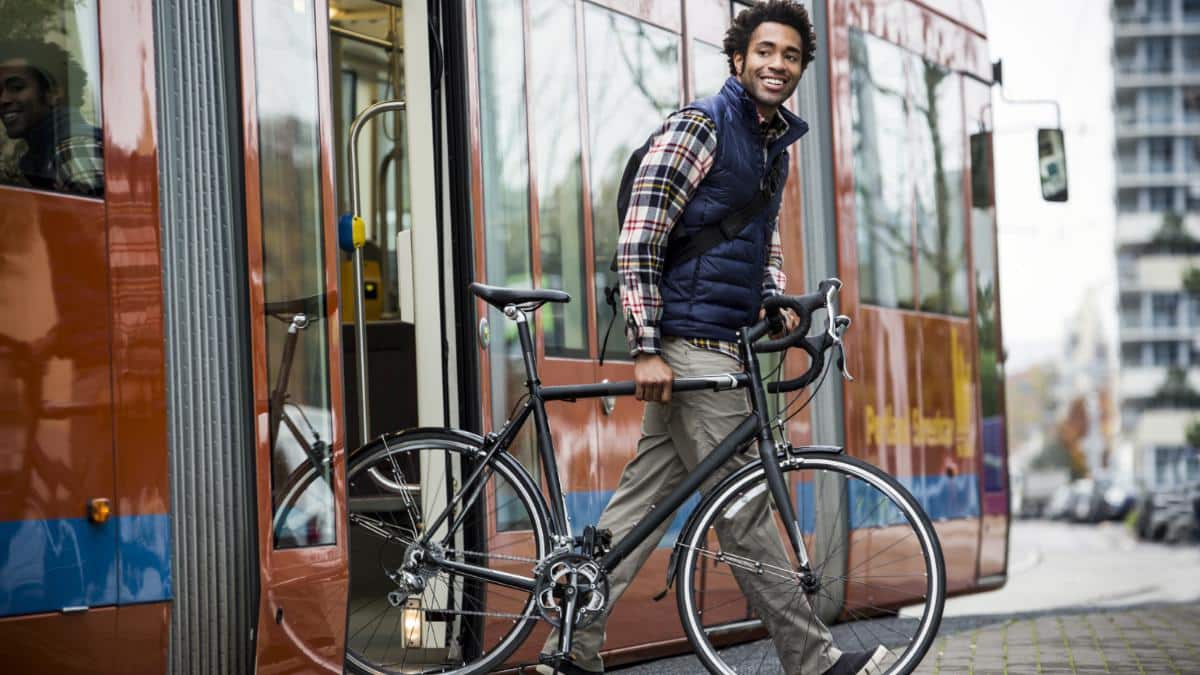

Cycling and using public transport are two ways to lower one's carbon footprint. Jordan Siemens / Getty Images
There’s no doubt that tackling the climate crisis will require drastic action on a global scale. But there are also some personal changes you can make to curb your carbon footprint in the new year.
Go Car Free
Instead of taking the car, consider using public transport or cycling — even just one day a week. Emissions from the transport sector make up a fifth of CO2 emissions, with the largest contributors being road vehicles like cars and buses. According to the Center for Research into Energy Demand Solutions (CREDS), going car-free can save an average of 2.04 tons of CO2 equivalent per person annually.
Fly Less
When traveling long distances, take a train rather than a plane. Aviation contributes up to 2.5% of the world’s global carbon emissions. And taking one fewer long-haul return flight per year can save 1.68 tons of CO2 equivalent per person per year, according to CREDS. If you can’t avoid flying, you could also offset your emissions by donating to sustainable projects.
Eat Less Meat
One way to lower your footprint is by eating less red meat in favor of plant-based alternatives, or swapping it for pork or poultry. Food production is responsible for about a quarter of global emissions — and the meat and dairy sectors are major contributors. A 2018 study found that producing a kilo of beef emits 60kg of greenhouse gases, compared to 6kg for poultry, or just 1kg for peas.
Cut Down on Waste
About one-third of food produced globally is lost or wasted, contributing up to 10% of carbon emissions, according to the UN. When it ends up in landfills and rots, it produces the potent greenhouse gas methane. Households are responsible for a large portion of this waste. So you can curb your footprint in 2021 by planning meals, buying only what you need, and by freezing and reusing leftovers.
Start a Garden
Why not introduce some new plants to your balcony or garden? Another way to reduce the amount of methane ending up in the atmosphere is by composting food waste in a bin and using it to nourish your plants. You don’t need much space to grow veggies, and doing so can cut the footprint of your food. Adding insect-friendly plants to the mix will also attract pollinators like butterflies or bees.
Avoid Fast Fashion
Making a pledge to buying fewer clothes in 2021 is another way to limit your carbon footprint. If you do need a new item, look for options that are second hand, or consider swapping or renting. According to the UN, the fashion industry produces about 10% of global carbon emissions. A main culprit is “fast fashion” — cheap clothes that are rapidly bought and thrown out as trends change.
Reposted with permission from Deutsche Welle.
- The Essential Guide to Eco-Friendly Travel - EcoWatch
- 8 Steps to a More Eco-Friendly Kitchen - EcoWatch
- 7 Eco-Friendly Fabrics That Will Green Your Wardrobe - EcoWatch
- Tiny Homes Are Very Eco-Friendly, New Research Confirms ...
- 15 Top Conservation Issues of 2021 Include Big Threats, Potential Bright Spots - EcoWatch

 233k
233k  41k
41k  Subscribe
Subscribe 